Suchergebnisse
IEA 4E Electric Motor Systems Annex: Round Robin of Converter Losses, Report of Results of Phase 1 (2019)

Dieses Dokument fasst die Ergebnisse des Round Robins für Frequenzumrichter zusammen. Dabei wurden Verluste von Frequenzumrichtern mithilfe eines einheitlichen Testprotokolls gemessen.
Emmanuel Agamloh, Advanced Energy; Andrew Baghurst, CalTest; Conrad U. Brunner, Impact Energy; Sandie B. Nielsen, DTI; Andrea Vezzini, BFH
Englisch, 60 Seiten
IEA Energiespeicher (ES) Task 35: Flexible Sektorkopplung durch Implementierung von Energiespeicher
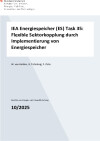
Task 35 des IEA Energy Storage TCP bearbeitete Flexible Sektorkopplung (FSC) durch Implementierung von Energiespeichern und untersuchte die Rolle von Energiespeichern im Zusammenhang mit dem Konzept der Sektorkopplung. Als Sektoren gelten die Bedarfssektoren Elektrizität, Heizung/Kühlung und Mobilität. FSC wurde definiert, Beispiele für FSC wurden beschrieben und Studien zum Einsatz von FSC in lokalen und im deutschen Energiesystem durchgeführt.
Schriftenreihe
10/2025
W. van Helden, G. Totschnig, F. Ochs
Herausgeber: BMK
Deutsch, 34 Seiten
Downloads zur Publikation
IEA Fortschrittliche Brennstoffzellen (AFC) Task 33: Stationäre Brennstoffzellen
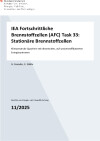
Klimaneutrale Quartiere mit dezentralen, auf wasserstoffbasierten Energiesystemen
Schriftenreihe
11/2025
G. Simader, E. Sibille
Herausgeber: BMK
Deutsch, 42 Seiten
Downloads zur Publikation
IEA ISGAN Annex 6: The role and interaction of microgrids and centralized grids in developing modern power systems – A case review (2017)

Dieser Bericht beschreibt, wie Microgrids zu einer globalen Elektrifizierung und einer Reduktion von CO2-Emissionen beitragen können.
Jonas Tjäder, Susanne Ackeby
Herausgeber: ISGAN Annex 6
Englisch, 37 Seiten
IEA-ISGAN Annex 5 (SIRFN): Design and Evaluation of SunSpec-Compliant Smart Grid Controller with an Automated Hardware-in-the-Loop Testbed (2017)

Im Rahmen von IEA-ISGAN-SIRFN wurde ein Hardware-In-The-Loop Prüfverfahren für die automatisierte Validierung der Interoperabilität von Smart Grid Wechselrichtern entwickelt und auf Basis der AIT Smart Grid Converter Plattform getestet.
Herausgeber: IEA-ISGAN, SIRFN
Englisch, 6 Seiten
Downloads zur Publikation
IEA EBC Annex 66: Newsletter No. 2 July 2015

Herausgeber: IEA EBC Annex 66
Englisch, 11 Seiten
Downloads zur Publikation
IEA International Smart Grid Action Network Annex 5: Internationales Netzwerk für Smart-Grids-Forschungsinfrastruktur
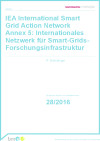
Schriftenreihe
28/2016
R. Bründlinger
Herausgeber: BMVIT
Deutsch, 32 Seiten
Downloads zur Publikation
IEA ISGAN Annex 1: Bestandsaufnahme intelligenter Netze, IEA ISGAN Annex 2: Fallstudien intelligenter Netze (Arbeitsperiode 2013 - 2019)
Das International Smart Grid Action Network (ISGAN) hat sich zum Ziel gesetzt, das Verständnis der Smart-Grid-Technologien zu verbessern und deren Entwicklung und Verbreitung weltweit voranzutreiben. Das primäre Ziel der österreichischen Beteiligung an IEA ISGAN Annex 1 und 2 war die Steigerung der Effizienz der heimischen Energieforschung erstens durch die international führende Positionierung österreichischer F&E-Projekte und zweitens durch den breiten Know-how-Austausch und die Einbringung internationaler Erkenntnisse in laufende und zukünftige österreichische Projekte.
Whitepaper "Smart Grid Cyber Security"

Das White Paper setzt sich kritisch mit dem Thema der Cyber Security in Smart Grids auseinander. Des Weiteren werden der aktuelle Stand sowie die notwendigen Schritte für sichere und zuverlässige Netze beschrieben.
IEA-ISGAN Annex 1: Global Smart Grid Inventory IEA-ISGAN and Annex 2: Smart Grid Case Studies
The international Smart Grid Action Network (ISGAN) aims to improve the understanding of Smart-Grid-technologies and to accelerate global deployment. The work in ISGAN is structured in eight standing working groups (annexes). The present project describes the Austrian contribution to Annex 1: Smart Grids Inventory and Annex 2: Smart Grids Case Studies.
IEA HPT Annex 51: Lärmemissionen reduzieren – AIT-Experten forschen an der Reduktion akustischer Wärmepumpen-Emissionen (2019)

HLK ist ein österreichisches Fachmagazin für Heizung, Lüftung, Klima- und Kältetechnik. Der Artikel über Aktivitäten im IEA HPT Annex 51, Weiterbildung im Bereich Wärmepumpe mit Akustikschwerpunkt und der AR Akustik-App „HVAC Positioner“ wurde in Ausgabe 10/2019 veröffentlicht.
Herausgeber: WEKA Industrie Medien GmbH/2019
Deutsch
IEA AFC Annex 35: Brennstoffzellen für portable Anwendungen (Arbeitsperiode 2014 - 2017)
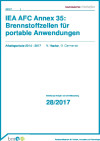
IEA-AFC Annex 35 zielt auf den Informationsaustausch über den derzeitigen Status und die neuen Entwicklungen im Bereich der portablen Brennstoffzellen ab und umfasst die Entwicklung und die Herstellung der Membran-Elektroden-Einheit (MEE), bis hin zu Systemkomponenten wie elektrische Konverter oder die Gasversorgung. Des Weiteren sind auch Aufbau und Auslegung von Hybriden sowie Aspekte der Sicherheit und Normierung von Interesse.
Schriftenreihe
28/2017
V. Hacker, B. Cermenek
Herausgeber: BMVIT
Deutsch, 34 Seiten
Downloads zur Publikation
IEA ISGAN Newsletter No. 11 - August 2016

Der Newsletter berichtet über das 11. Executive Meeting in Japan, den ISGAN Award of Excellence sowie aktuelle Veranstaltungen, Aktivitäten und Publikationen.
Herausgeber: ISGAN Secretariat, Korea Smart Grid Institute
Englisch, 5 Seiten
IEA Wärmepumpentechnologien (HPT) Annex 43: Brennstoffbetriebene Wärmepumpen
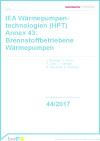
Das Ziel war es, die Effizienz und das Marktpotenzial gasbefeuerter Absorptionswärmepumpen (AWPs) in Wohn- und kleinen kommerziellen / industriellen Gebäuden bzw. Anwendungen zu untersuchen.
Schriftenreihe
44/2017
J. Emhofer, T. Fleckl, A. Zottl, C. Köfinger, R. Wechsler, R. Rieberer
Herausgeber: BMVIT
Deutsch, 43 Seiten
Downloads zur Publikation
IEA 4E TCP-PECTA: Leistungselektronik zur Steuerung und Umwandlung elektrischer Energie (Arbeitsperiode 2019 - 2021)
Der Power Electronic Conversion Technology Annex (PECTA - Leistungselektronik zur Steuerung und Umwandlung elektrischer Energie) ist einer von vier Annexen im IEA 4E Technologieprogramm (TCP). PECTA soll dabei das Effizienzpotential unter Verwendung und durch Integration von Halbleitern mit weitem Bandabstand (Wide-Bandgap WBG) in Leistungselektronikapplikationen evaluieren und als unabhängige Informations- und Wissensplattform für politische Entscheidungsträger zum Thema WBG dienen.
IEA 4E TCP-PECTA: Power Electronic Conversion Technology (Working period 2019 - 2021)
The IEA 4E Power Electronic Conversion Technology Annex (PECTA) aims to evaluate the efficiency potential related to the integration of Wide Bandgap (WBG) based power semiconductors for relevant applications and to act as an independent knowledge platform. In the first work period, energy savings have been initially assessed for selected applications, a roadmap for WBG materials was derived and the work plan for PECTA's Phase 2 was defined.
IEA IETS Annex 15: Industrielle Abwärmenutzung (Phase 3)
Im Rahmen des IEA IETS Annex 15 (Phase 3) wurden Potentiale für die Nutzung von Abwärme sowie Technologien zu deren Integration durch Beiträge aus nationalen Forschungstätigkeiten gesammelt, gebündelt und aufgearbeitet. Die Beiträge des österreichischen Konsortiums umfassten Technologieentwicklung und Integrationskonzepte von Wärmepumpen- und Energiespeichern, Risikoanalysen bei der Umsetzung von Abwärmeprojekten und Arbeiten zur Betriebsoptimierung und Auslegung von hybriden Energiesystemen.
IEA IETS Annex 15: Industrial Excess Heat Recover (Phase 3)
Within the framework of the IEA IETS Annex 15 (Phase 3), potentials for the use of waste heat as well as technologies for its integration are collected, bundled and processed through contributions from national research activities. The contributions of the Austrian consortium included technology development and integration concepts of heat pump and energy storage systems, risk analysis in the implementation of waste heat projects, and work on operation optimization and design of hybrid energy systems.
IEA 4E: Annex Elektrische Motorsysteme. Arbeitsperiode 2021 - 2024
Im Rahmen des Annex Electric Motor Systems soll Bewusstseinsbildung über das große Energieeinsparpotenzial von Motorsystemen und das Aufzeigen von Wegen zur Realisierung dieser Potenziale erfolgen. Nach der Erarbeitung der Politik- und Energieauditleitfäden für Motorsysteme leitet Österreich den Task „Neue industrielle Entwicklungen und Digitalisierung in Motorsystemen“.
IEA 4E: Annex Electric Motor Systems. Working period 2021 - 2024
The goal of the Annex Electric Motor Systems is to raise awareness on the large savings potential in motor systems, while showing the realization method of such a path. After publishing the policy and audit guidelines for motor systems Austria leads the task „New Industrial Developments and Digitalization in Motor Systems“.
